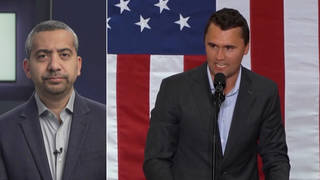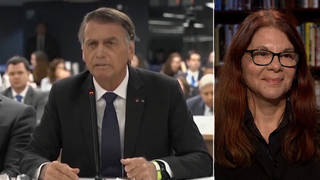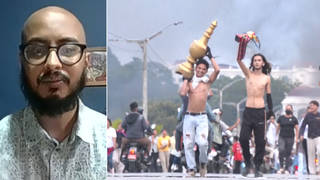
Guests
- Michael WinshipPresident of the Writers Guild of America, East.
The writers’ strike has entered its 68th day. Over 10,000 members of the Writers Guild of America went on strike November 5 over the refusal of the Alliance of Motion Picture and Television Producers to pay writers for reruns of their work online and for original work written for the internet. We speak to Michael Winship, president of the Writers Guild of America, East. [includes rush transcript]
Transcript
JUAN GONZALEZ: The writers’ strike has entered its sixty-eighth day. Over 10,000 members of the Writers Guild of America went on strike November 5th over the refusal of the Alliance of Motion Picture and Television Producers to pay writers for reruns of their work online and for original work written for the internet.
The effect of the strike has been felt across the entertainment industry. This week, NBC was forced to cancel the Golden Globe ceremony after actors announced they would refuse to cross the picket line to attend the ceremony. Instead of a star-studded Hollywood event, NBC will air a one-hour news conference on Sunday announcing the winners.
AMY GOODMAN: Meanwhile, over the past week and a half, several of the nation’s most popular late-night hosts returned to the airwaves. Jay Leno, Jon Stewart, Stephen Colbert are producing shows without their writers. But one late-night host reached a deal with the union: David Letterman.
DAVID LETTERMAN: By the way, ladies and gentlemen, you’re watching The Late Show, the only show on the air now that has jokes written by union writers.
Thank you very much. Let me just bring you up to date. There is a writers’ strike going on, the Writers Guild of America. And we were out, because of the strike, for two months. And I know you’re thinking to yourselves at home right now, “This crap is written?” Yes.
AMY GOODMAN: On Thursday, filmmakers Harvey and Bob Weinstein announced that they too had reached an agreement to allow striking Hollywood writers to return to work.
Michael Winship is the president of Writers Guild of America, East. He joins us in our firehouse studio. Welcome, Michael.
MICHAEL WINSHIP: Nice to be back. Thank you.
AMY GOODMAN: Tell us the state. Are the late-night talk show hosts breaking the strike by going back to work?
MICHAEL WINSHIP: The Letterman and Craig Ferguson shows are back at work with their writers, because they reached an independent agreement with us. Because Letterman’s company, Worldwide Pants, is an independent company, they were able to do that. So those two shows are back on the air with their writing staffs. And I think you can tell from the quality of their shows that they definitely have their writers back.
The other shows — Stephen Colbert, Jon Stewart, Conan O’Brien, Jimmy Kimmel, Jay Leno — they have all gone back to work without their writing staffs, and we continue to consider those struck shows.
JUAN GONZALEZ: Now, is that because they don’t have independent companies or just that they are not supporting the strikers?
MICHAEL WINSHIP: Their shows — no, actually, in point of fact, they’ve all — all the hosts have been very supportive of the strike, and they’ve been very supportive of their writing staffs.
Our beef is that those programs are owned and shown by companies that are a part of the Alliance of Motion Picture and Television Producers, against whom we’re still on strike and who have refused to come back to the bargaining table. Conan O’Brien, obviously, owned by NBC; Jay Leno, owned by NBC. And then we have a sort of — it’s a little bit of a shady area in terms of who owns what, in terms of the Stewart and Colbert shows, but we’re trying to work that out. It’s conceivable that there might be a deal with those shows. But right now, we’re striking those shows because of Comedy Central and Viacom.
AMY GOODMAN: Well, as you say, a number of the late-night hosts have used the shows to voice solidarity with the striking writers. Jon Stewart of The Daily Show returned to air Monday and spent most of the show discussing the strike.
JON STEWART: The dispute is actually between the Writers Guild of America and the Association of Motion Picture and Television Producers, or NAMBLA. Now, that joke is grandfathered in. That’s from a long damn time ago! The dispute is over pay for the internet. The writers [inaudible] want to be paid for internet content. Now, they’re already paid for content that is on television, so why is the internet any different from television? It’s a very interesting question. Now, you may say to yourself, “Jon, I’ve been on the internet, and I’ve been on the iTunes, and your show costs $1.99 per episode. Why shouldn’t the writers get a piece of that?” Well, that’s not a content charge. That’s a shipping and handling charge. Should the writers be paid for shipping and handling? Because what is the internet?
SEN. TED STEVENS: It’s a series of tubes!
JON STEWART: That’s right, it’s a series of tubes. That was Senator Ted Stevens, the ex-head of the Commerce Committee in the Senate, responsible for regulating the internet. That $1.99 goes to fuel for tiny trucks and also for Blackwater mercenaries that guard against World of Warcraft wizards.
AMY GOODMAN: That was Jon Stewart explaining the strike. Michael Winship, he also showed, in one of his Zen moments at the end of the show, the strikers outside. There are picket lines set up outside the Jon Stewart show —-
MICHAEL WINSHIP: Yes, there are picket lines.
AMY GOODMAN: —- which he now calls “A Daily Show,” instead of The Daily Show, and Stephen Colbert’s show.
MICHAEL WINSHIP: Exactly, exactly. Yes, there are picket lines outside of the shows basically for two reasons. One, the one I already mentioned, was that we’re actually protesting Viacom and Comedy Central, not Jon specifically or Stephen specifically. And the other reason is that we’re asking people not to cross the picket lines to appear as guests on those shows.
AMY GOODMAN: And so, there have been guests, of course.
MICHAEL WINSHIP: There have been guests. Some people have chosen not to —-
AMY GOODMAN: Andrew Sullivan was on.
MICHAEL WINSHIP: Yes, yes. But other folks -— I know, for example, Mayor Bloomberg last week did not appear on Conan O’Brien because of the picket lines. I’m under the impression that John Edwards did not appear this week on Jon Stewart because of the picket line.
AMY GOODMAN: Huckabee did appear on one of the shows.
MICHAEL WINSHIP: Huckabee crossed the picket line. He feigned ignorance of the rules. He said that he thought that there was a waiver for everybody, for all the shows, which I think was somewhat disingenuous on the governor’s part. But, yeah, he did cross the line.
JUAN GONZALEZ: What’s the estimates right now in terms of the damage being incurred by the employers on this strike?
MICHAEL WINSHIP: Well, we’ve heard that in terms of the economy, especially in Los Angeles, that there’s an effect of around $21 million a day. We know that they’re taking enormous hits. We know that, for example, you talked about the Golden Globes. Publicly, there have been estimates issued of between $50 million and $20 million of lost advertising revenues. We’ve heard as much as $60 million in terms of a loss for NBC.
JUAN GONZALEZ: And is there any effort to get back to the table, to actually attempt to negotiate a deal?
MICHAEL WINSHIP: Oh, sure. I mean, there’s always back-channel talk that’s going on. We’re very hopeful. They walked away from the table on December 7th. And I should point out that the agreements we’ve been making with Letterman and some of these independent film companies, those agreements are virtually identical to the deal that we had on the table when the AMPTP walked away from the table. But yeah, I mean, the ball is in their court. It’s up to them to come back. We have a standing offer to come back anytime, anywhere, to talk with them.
JUAN GONZALEZ: Are there any particular companies that represent the hard-line position, in other words, that are insisting to stay out and withstand and outlast the writers?
MICHAEL WINSHIP: Well, at the moment, in terms of the big media conglomerates, if you take like the big six of those companies that own so much of the media business in the country and in the world, I’d have to say all of them are still hard-liners at this point.
AMY GOODMAN: Who are the big six?
MICHAEL WINSHIP: Well, you’re talking about General Electric in terms of NBC. You’re talking about Viacom. You’re talking about CBS. You’re talking about Sony and Disney and Time Warner. So that’s actually seven.
AMY GOODMAN: So you’re saying that guests should not cross these picket lines. You had, for example, Lou Dobbs was on with Jon Stewart last night.
MICHAEL WINSHIP: Yes, that’s right. Yeah, I would have to say not surprisingly, but he did cross the picket line, yeah. We’re asking people not to cross the picket line. We’ve had enormous success with the Screen Actors Guild. The Screen Actors Guild has been working very closely with us, and they have actively urged their members not to cross the picket line.
AMY GOODMAN: And though Stewart explained it, the exact demands of the writers right now? And have you made any headway in negotiations?
MICHAEL WINSHIP: Not thus far. Not thus far. We continue to be hopeful. I mean, nothing has happened since they walked away December 7th. But as I said, we are hopeful that these independent agreements, which do accept the demands that we’ve been making in terms of the internet and new media, we’re hopeful that that will be taken as sort of partly a divide-and-conquer strategy, but that also people will recognize that we do have the ability to bargain a contract. One of the accusations of the AMPTP was that we are so stubborn that we are incapable of negotiating a contract. We’re showing that that’s not the case with these independent deals.
JUAN GONZALEZ: And in those independent deals, what are some of the key characteristics around the issues of the internet? What have you been able to secure?
MICHAEL WINSHIP: Well, what we’ve been doing basically is securing deals right now for things like streaming video. When Jon referenced the $1.99 fee, you know, for streaming video for an episode of The Daily Show, our members don’t see a dime of that right now. They don’t see a nickel of it. So the deals that we’re doing now, they do get revenue on that, and then there are revenues for the creation of original material for internet, which are commensurate with the fees that are currently paid for television and motion pictures.
AMY GOODMAN: I heard that Sumner Redstone was supposed to be honored by the Paley Center on, I think it was, February 7th —-
MICHAEL WINSHIP: Right.
AMY GOODMAN: —- and I heard Jon Stewart was supposed to be the master of ceremonies.
MICHAEL WINSHIP: Jon Stewart is the MC, yeah.
AMY GOODMAN: Is he going to do it?
MICHAEL WINSHIP: As far as I know, he’s still scheduled to do it, and I think, you know, it’s safe to assume that if we’re still on strike, that we will be there, too. Our pickets will be there. We will definitely be there. Our presence will be known.
AMY GOODMAN: Michael Winship, the Oscars, will they be happening? And specifically, is there a specific demand around the issue of digital rights, what the writers want of the profits?
MICHAEL WINSHIP: Well, the standing — it’s kind of complicated, because it has several different aspects to it, but the standing deal that was on the table when the AMPTP walked away was a 2.5% on the download rentals of movies and television. For streaming, it was 3% of the basic applicable minimum. In other words, what scale would be for a half-hour TV show was 3% per 100,000 hits, so you would get 3% of your minimum for the first 100,000 hits, and then it would keep increasing by 3% with each additional 100,000 hits. Then, in terms of jurisdiction, in terms of original material for the internet, that, as I said, would be pegged to what the current fees are for TV and motion pictures.
JUAN GONZALEZ: And do you have any estimates right now of what the estimate of the revenues are for these companies from the internet compared to regular television?
MICHAEL WINSHIP: It’s sort of a — you know, it’s sort of a new unexplored territory for all of us, but, Amy, you were mentioning in the break that NBC had announced this week that they were seeing something like $1 billion in revenues from digital media. So we know that there is money being made. We’ll have to figure out formulas to determine these percentages and the actual numbers involved. We’ve said right along that the revenue model that we’re seeking is basically technology-neutral, that by asking for a straight percent of revenues, that that will not change, no matter what the medium is.
AMY GOODMAN: We only have five seconds.
MICHAEL WINSHIP: Yeah.
AMY GOODMAN: Are the writers being paid by a strike fund or anything? Are they getting any money right now?
MICHAEL WINSHIP: There is, in fact, a strike fund, to which writers can apply for loans to cover expenses.
AMY GOODMAN: But they’re not getting any kind of steady income right now.
MICHAEL WINSHIP: Not getting any. The talk-show hosts, I mean, I have to say again — Jon Stewart, Stephen Colbert, all these folks — for the first couple of months of the strike, they were paying their writing staffs.
AMY GOODMAN: But right now —-
MICHAEL WINSHIP: But right now, no.
AMY GOODMAN: —- they’re sort of out in the cold.
MICHAEL WINSHIP: Yeah.
AMY GOODMAN: I want to thank you very much, Michael Winship, president of the Writers Guild of America, East. This is the sixty-eighth day of the writers’ strike.











Media Options